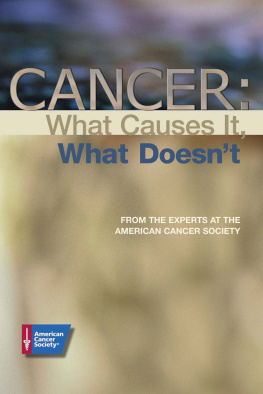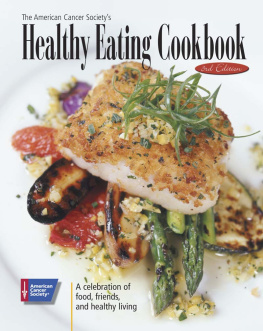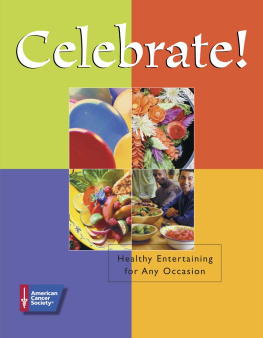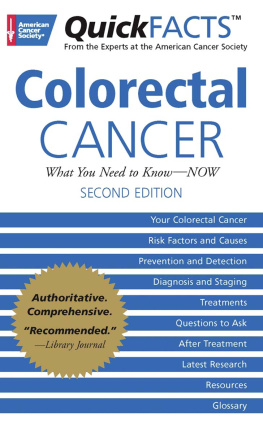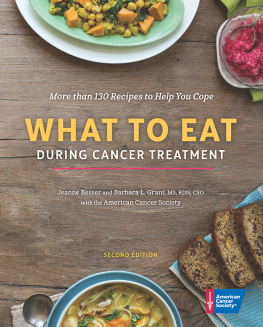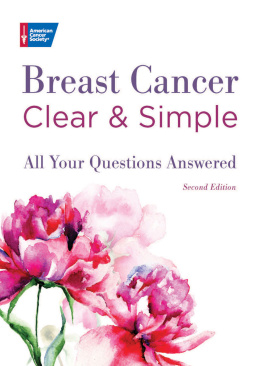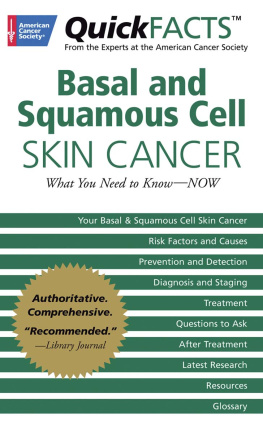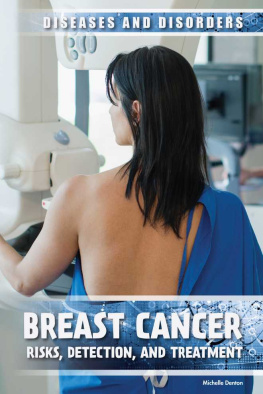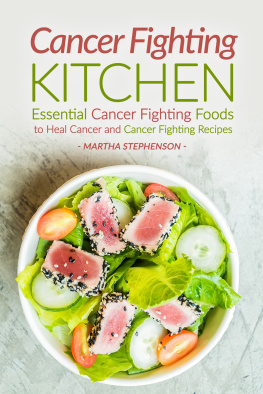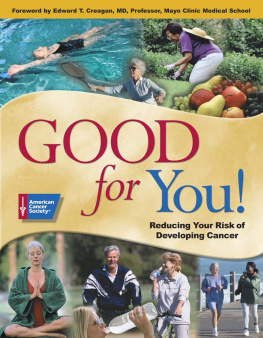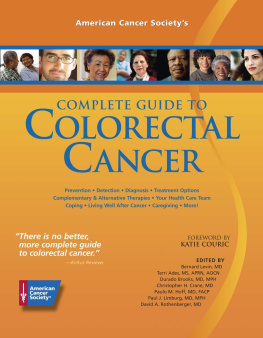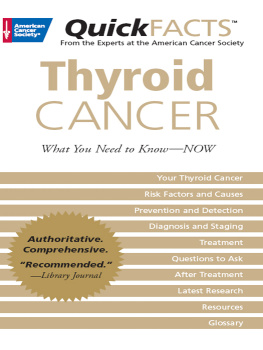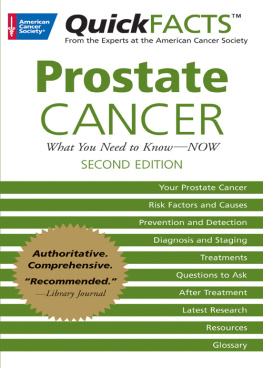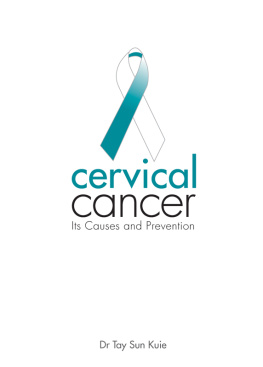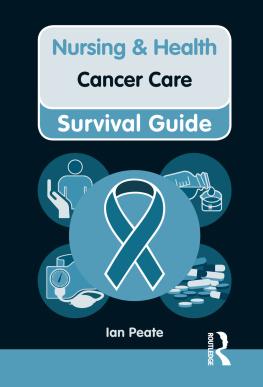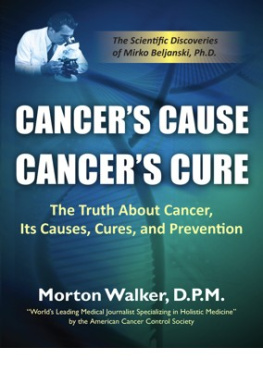
Books published by the American Cancer Society
A Breast Cancer Journey: Your Personal Guidebook
American Cancer Societys Complementary and Alternative Cancer Methods Handbook
American Cancer Societys Guide to Complementary and Alternative Cancer Methods
American Cancer Societys Guide to Pain Control
Angels & Monsters: A Childs Eye View of Cancer, Murray and Howard
Because Someone I Love Has Cancer: Kids Activity Book
Cancer in the Family: Helping Children Cope with a Parents Illness, Heiney et al.
Caregiving: A Step-By-Step Resource for Caring for the Person with Cancer at Home, Houts and Bucher
Colorectal Cancer: A Thorough and Compassionate Resource for Patients and Their Families, Levin
Coming to Terms with Cancer: A Glossary of Cancer-Related Terms, Laughlin
Consumers Guide to Cancer Drugs, Wilkes, Ades, and Krakoff
Couples Confronting Cancer: Keeping Your Relationship Strong, Fincannon and Bruss
Crossing Divides: A Couples Story of Cancer, Hope, and Hiking Montanas Continental Divide, Bischke
Good for You! Reducing Your Risk of Developing Cancer
Informed Decisions: The Complete Book of Cancer Diagnosis, Treatment, and Recovery, 2nd Edition, Eyre, Lange, and Morris
Kicking Butts: Your Path to Quitting Smoking
Our Mom Has Cancer, Ackermann and Ackermann
Prostate Cancer: What Every Manand His FamilyNeeds to Know, Revised Edition, Bostwick et al.
Women and Cancer: A Thorough and Compassionate Resource for Patients and Their Families, Runowicz, Petrek, and Gansler
Also by the American Cancer Society
American Cancer Societys Healthy Eating Cookbook: A Celebration of Food, Friends, and Healthy Living, 2nd Edition
Celebrate! Healthy Entertaining for Any Occasion
Kids First Cookbook: Delicious-Nutritious Treats to Make Yourself!

Published by
American Cancer Society
Health Promotions
1599 Clifton Road NE
Atlanta, Georgia 30329, USA
Copyright 2003 American Cancer Society All rights reserved. Without limiting the rights under copyright reserved above, no part of this publication may be reproduced, stored in or introduced into a retrieval system, or transmitted, in any form or by any means (electronic, mechanical, photocopying, recording, or otherwise), without the prior written permission of the publisher.
Printed in the United States of America Cover designed by Jill Dible, Atlanta, GA
Managing Editor
Gianna Marsella, M.A.
Editor
Amy Sproull Brittain
Copy Editor
Anneke Smith
Contributing Writer
Carol Clark
Editorial Review
Rick Alteri, M.D.
Ted Gansler, M.D., M.B.A.
Managing Director, Direct Channels
Chuck Westbrook
Director, Publishing
Diane Scott-Lichter, M.A.
Book Publishing Manager
Candace Magee
5 4 3 2 1 03 04 05 06 07
Library of Congress Cataloging-in-Publication Data
Cancer: what causes it, what doesnt.
p. ; cm.
ISBN 0-944235-44-1 (pbk.: alk. paper)
1. Cancer--Risk factorsPopular works. 2. Cancer--Etiology--Popular works.
[DNLM: 1. Neoplasms-etiology-Popular Works. 2. Neoplasms-genetics-Popular Works. QZ 201 C2149 2003] I. American Cancer Society.
RC263.C298 2003
616.994071--dc21
2003001116
A N OTE TO THE R EADER
The information contained in this book is not intended as medical advice and should not be relied upon as a substitute for talking with your doctor. This information may not address all possible actions, precautions, side effects, or interactions. All matters regarding your health require the supervision of a medical doctor who is familiar with your medical needs. For more information, contact your American Cancer Society at 800-ACS-2345 (www.cancer.org).
Contents
Introduction
C AN YOU GET CANCER FROM DEODORANT, talcum powder, or cellular phones? Which cancer risks should you be concerned about and which are just rumors? What do your everyday activities and genetic makeup have to do with your personal cancer risk? How does cancer start and why?
No one book can draw a complete picture of cancercancer has perplexed humans for at least 5,000 years. Researchers discover new information at such a fast pace that it would be a challenge for anyone to absorb it all. It seems that the more answers we find, the more questions we raise.
But this book shares much of what we know about the how and why of cancer. As we dispel myths, explain risks, and explore the ins and outs of cancer, we hope youll gain valuable understanding about cancer, what causes it, and what doesnt.
Information Overload
Cancer is in the headlines every day. Unsubstantiated rumors about cancer hitch a ride on the Internet and rocket around the world in a matter of hours. Daily news articles report on the potential risks of ordinary substances we come into contact with, frightening us and making us rethink our choices.
People shouldnt panic when they hear that a new study shows a substance causes cancer in micenor should they believe they are immune from cancer because they eat well and exercise regularly, advises C. Everett Koop, M.D., former U.S. Surgeon General and director of the Koop Institute at Dartmouth Medical School in Hanover, New Hampshire.
When you concentrate on the wrong information about cancer, you dont do the right things that could save your life, Koop says.
This book will help you concentrate on the right information. Well clear up some common misconceptions about the causes of cancer and give you the facts you need to know about cancer risks you inherit and those you can control.
Find Out the Real Risks
Compelling reports about the role of genetics in cancer, the effects of powerful environmental carcinogens (chemicals and other exposures that cause cancer), and the possibility of radiation leaks from nuclear power plants sometimes obscure a key cancer issue: Two-thirds of all fatal cancers are associated with lifestyle choices. So while some cancer risks are out of your hands, some are squarely in your control. Factors as basic as what you eat and drink can affect your cancer risk.
We really have an enormous amount of control over our risks, says Eugenia Calle, Ph.D., the American Cancer Societys director of analytic epidemiology. If everybody maintained a lean body mass, didnt smoke, ate a lot of fruits and vegetables, protected their skin from the sun, and exercised every day, we would live in a different society. It doesnt mean that cancer would be gone. But it would have a huge, huge impact on the rates of cancer.
Cancer: Past, Present, and Future
Today cancer is a disease that can often be diagnosed early and treated successfully, allowing more and more people to call themselves cancer survivors. But even before we had a name for cancer, it was claiming lives.
In chapter , we retrace the history of our struggle to understand cancer, from the mysticism of ancient Egypt to the many new directions molecular science is taking. Well relive the dramatic discoveries that have saved lives and that have implications for discoveries still to come.
Next page
